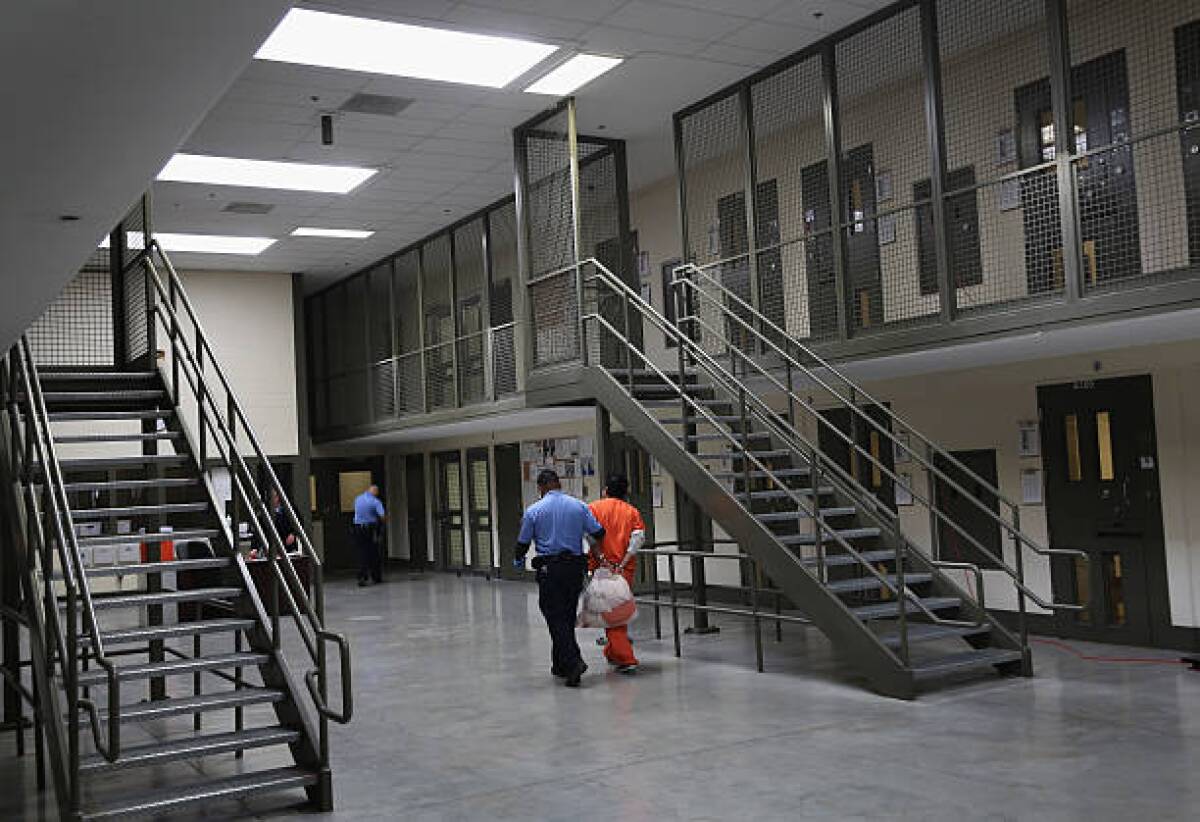ICE signs contracts extending private immigrant detention centers ahead of California ban

- Share via
Federal officials signed contracts last week totaling nearly $6.5 billion with the companies that run California’s four private immigrant detention centers, less than two weeks before a ban on such contracts is set to begin.
Under the new contracts, which took effect Friday, detention space in California is set to double to nearly 7,200 beds.
In October, California became the first state to kick out privately run immigrant detention centers. A new law prohibits new contracts or changes to existing ones after Jan. 1 and phases out existing detention facilities entirely by 2028. The law also bans private prisons.
But within days of Gov. Gavin Newsom signing Assembly Bill 32 into law, U.S. Immigration and Customs Enforcement officials posted a solicitation — a request for offers — to a federal website seeking at least four detention facilities around the state. Details for the request, including location and bed space, appeared to closely match existing facilities. ICE specified that facilities needed to be “turnkey ready” by the start of the contract. Interested companies had two weeks to respond.
State legislators including Assemblyman Rob Bonta (D-Alameda), who wrote the bill, and advocates for immigrants called the solicitation a blatant attempt by ICE to circumvent the law in order to continue detaining immigrants in California. Last month, 21 congressional leaders, including Sens. Dianne Feinstein and Kamala Harris, released a letter to Kevin McAleenan, then-acting secretary of the Department of Homeland Security, expressing concern with ICE’s contracting process and asking for communications about the solicitation.
ICE spokeswoman Paige Hughes said the agency has remained compliant with federal contract and acquisition regulations throughout the solicitation and award process. She said the contracts are not affected by the limitations imposed by AB 32.
“State laws aimed at obstructing federal law enforcement are inappropriate and harmful,” Hughes said in a statement.
According to the new contracts, ICE received one offer for each of the four facilities it was seeking — from the three private prison companies that run each of the current facilities.
The GEO Group runs the Adelanto ICE Processing Center in San Bernardino County and the Mesa Verde ICE Processing Center near Bakersfield. CoreCivic operates the Otay Mesa Detention Center in San Diego. Management & Training Corp. runs the Imperial Regional Detention Facility in Calexico.
In a news release Monday, GEO Group announced the contracts expanding the Adelanto and Mesa Verde facilities. The contracts have terms of 15 years, inclusive of two five-year extensions. They fold in three other facilities owned by the company: the Central Valley and Golden State modified community correctional facilities near Bakersfield, as well as the Desert View Modified Community Correctional Facility adjacent to the Adelanto center.
GEO officials said the contracts will generate more than $200 million in revenue and 1,200 full-time jobs.
“These contracts will help the agency meet its need for processing center beds in California, avoiding the need to send individuals to other states away from their families and legal counsel, while also supporting 1,200 jobs in communities we have partnered with for 30 years,” said a company spokesperson.
Advocates emphasized that the new facilities will enable ICE to conduct more large-scale raids. Arrests have decreased in Northern California — from 7,200 in fiscal year 2017 to 5,100 this year — which advocates attribute to law enforcement officials in Sacramento and Contra Costa having stopped holding immigrants in their jails for deportation.
Jackie Gonzalez, policy director of Immigrant Defense Advocates, said that the value of the contracts combined with the fact that ICE received only one bid for each location confirms her belief that they were not awarded under a full and fair competition.
“ICE is a rogue agency that believes it can engage in illicit actions with these corporations in violation of the law,” she said. “They need to be checked.”
More to Read
Sign up for Essential California
The most important California stories and recommendations in your inbox every morning.
You may occasionally receive promotional content from the Los Angeles Times.











